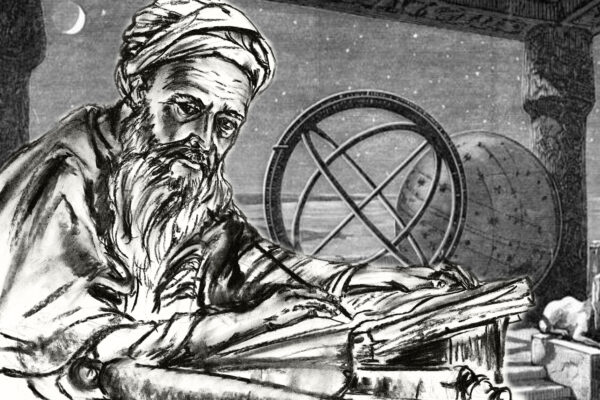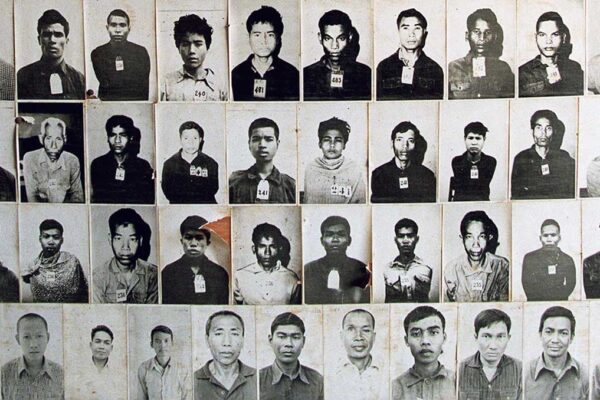Shariati: Capitalism and Marxism under the lens of tawhid
In the previous part of this three part series on Ali Shariati and his scholarship, we introduced Shariati as a unique exponent of social theory, one whose treatises can be located outside of the liberal social traditions and scholarship. Shariati challenges the normative liberal view of social life, particularly the assumption that man is rational, passionate and ungovernable—an idea that has remained consistent even as the paradigms within the tradition have evolved. In contrast, Shariati’s conception of man and his humanity, and the ideas of social order and society that ensue as a result, depart from this view and hence offer “true diversity of the social imagination”. But it needs to be noted that for Muslim readers, Shariati’s work—especially the grounding of his worldview in the concept of tawhid (Oneness of God)—opens the doors for grasping at this abstract notion of unassailable singularity of a supreme omnipotent entity in practical terms, going beyond its reality as a philosophical Islamic belief.
Shariati positions his critique of Capitalism, on the basis of two aspects; its characteristic speed to acquire material wealth and the lack of limits in doing so
In this part, we present Shariati’s critique of Capitalism and Marxism (covering Socialism and Communism), which he categorizes as social systems that are partly responsible for the “deformation and decline of humanity”. Then, we attempt to describe what Shariati meant by tawhid; his conception of divinity and its identity in relation to man’s being and to man’s natural and social environments. It should be noted by readers that this attempt is intended to generate interest in the man and his scholarship, hoping that it will be further explored, examined and studied by Muslims, especially given the relevance of Shariati’s arguments to today’s times where Muslims find their religious life increasingly alienated from the life of this world, as if they were two different of being. Shariati’s worldview based on concept of tawhid allows one to connect the abstract to the practical, the ethereal to the material of our day-to-day existence.
Man: An Economic Animal?
In contrast to Marx, whose arguments targeted the power structures across classes of people that become evident as materialism is pursued by each, Shariati contends that Capitalism and Communism (Socialism in its final form of social organization) are one and the same when it comes to their treatment of man as an economic animal. The only difference, Shariati argues, is the “differing contours which reflect the issue of which of the two will provide more successfully for the needs of this animal.” To a student of normative liberal view, this inverts the logic of comparing the two social systems because of how different the two are presented. Shariati pulls the logic of either or apart, focusing his analysis on man, but not in terms of man’s relation to labor or to his class position, but to his being in absolute terms.
Capitalism: The Imperative for Unhinged Growth
Shariati positions his critique of Capitalism, on the basis of two aspects; its characteristic speed to acquire material wealth and the lack of limits in doing so. The basis of capitalism and capitalist way of thinking is the belief that each individual has with themselves the capacity to enrich their material life by engaging in economic activities through a singular self-directed focus. The implicit assumption here is that human prosperity lies in achieving material wellbeing and material status. Not only does this assumption narrow down the ability to foresee consequences of this way of thinking on aspects that are intimately interconnected to human actions, like social and natural environments, it unwittingly renders man into a cog in a machine designed to pursue compulsive and unbridled growth with no real purpose or measure.
Marxism: The Directionless Mass Movement
Marxism, the ideology behind socialist and communist organization of social life, according to Shariati belies the contrasts that it presents to capitalism. Although Shariati provides an oft-cited and hence a weaker claim to criticize Marxist societies in that they have achieved the same immoral status as capitalist societies, he doubles down on this critique by highlighting, substantively, how Marxism relies on the same economic man to make the case against capitalist pursuits. According to Shariati, “Marxist and capitalist societies present a single kind of man to the marketplace of human history.”; “governmental dictatorship in the name of “dictatorship of the proletariat”” he complains about Socialism.
This critique of Marxism is unique to Shariati and clearly emerges from the Islamic underpinnings of his analysis. In effect, the critique he produces is regarded as invective, yet containing enough home truths. What drives Shariati to offer a scathing argument against Marxism is perhaps his disappointment in the way historical materialism subverts a clear opportunity—one where the critique of capitalism could have invoked the absolute value of man instead of how much use value he generates through his labor. Shariati identifies two parts to Marx’s work, one which he appreciates and the second which he despises. The one he appreciates is the criticism of capitalist way of thinking by Marx; thinking that perverts individuality by removing it from a social and communal consciousness and concern. The one he despises is the relocation of man back within the structures (and superstructures) upheld by the routinized, self-interested materialistic drive, with no actual purpose or direction.
Tawhid: The Essence of Being
Muslims around the world are familiar with the concept of tawhid—at the very least, in terms of how critical its profession is to the Muslim identity. The Holy Quran expounds its importance and explicates the consequences of deviating from it again and again at numerous instances (see 12:40, 17:22, 17:23, 17:39 and more). Tawhid is the first, among five articles of faith, where a Muslim—literally meaning one who submits—does so only to the One True Almighty, who has named Himself Allah, the most Merciful and extremely Beneficent. This may not seem like a profound article of Islamic faith to those who have grown up learning it since childhood, without necessarily comprehending its practical consequences. It is only upon reflection, in context of the turmoil and corruption that man’s hubris has wrought (30:41), that its importance is revealed. As Shariati posits, Tauhid for him:
“…means regarding the whole universe as a unity, instead of dividing it into this world and the hereafter, the natural and the supernatural, substance and meaning, spirit and body. It means regarding the whole of existence as a single form, a single living and conscious organism, possessing will, intelligence, feeling and purpose.”
It is because of this conception of oneness of this world and the afterlife, the ethereal and the material that Shariati is unable to reconcile with Marxism, even though he considers Marxism and Islam to “remain as serious alternatives for the advance of humanity, since only those two schemes are comprehensive views of the religious, social, and material worlds.”
It is the absolute power to man proffered by the concept of tawhid that Shariati wants to see harnessed in conceiving man’s social environment; one that requires his subservience to nothing but Allah, and which exhorts his freedom from wanton worldly desires in favor of submission to an elevated existence predicated on piety, nobility and patience. This is mainly because he sees a purpose behind humankind’s being, something that Quran speaks about in no uncertain terms (23:115). This orientation places Shariati’s analysis in confrontation with Capitalism—where man is asked to seek his desires without remorse or recourse to the consequences that arise, as well as with Marxism where man is encouraged to struggle for the fruits of his labor against those who unjustly cease it from him, without any other purpose but self-satisfaction and self-adoration.
Tawhid may not seem like a profound article of Islamic faith to those who have grown up learning it since childhood, without necessarily comprehending its practical consequences.
What is most interesting about Shariati’s conception of tawhid, which also happens to be in concurrence with mainstream Shia theology, is that it corroborates emerging arguments, coming out of Western scholarship, about what is so wrong with the world. In times when the talk of the next system is rife, Shariati’s contextualization of tawhid in practical terms, invites the attention of Muslims who are engaging in contributing to bettering the world, and overturning the wrongs alongside their non-Muslim brethren. In the next section, we focus more closely on the application of the concept of Tauhid to the natural ecosystems and man’s role and responsibility towards them; we look at how emerging views from ecological and associated sciences are independently arriving at the message of Oneness of Everything—something that the Holy Quran declared 1400 years ago, and which Shariati’s scholarship is helping us rediscover.










